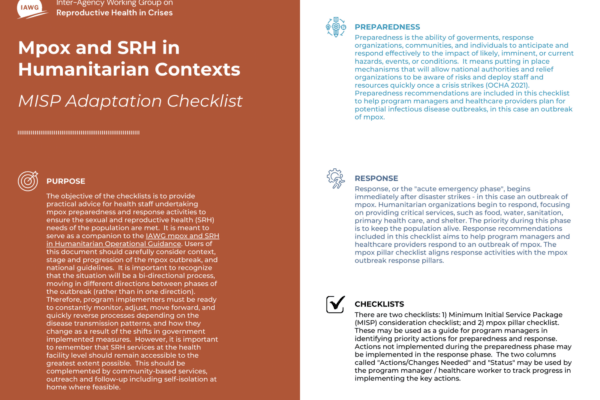This assessment examines the extent to which humanitarian and SRHR issues are integrated in regional and national humanitarian and SRHR frameworks in East and Southern Africa. This is one of two companion reports and focuses on the integration of SRHR issues into national humanitarian policies and strategies, as well as SRHR frameworks.
No Matter When or Where: Addressing the Need for Continuous Family Planning Services During Shocks and Stressors
Sarah Rich, Lily Jacobi, Nesrine Talbi, et al.PROPEL Adapt, with FP2030 and WRC, recently published an article that emphasizes the critical need for uninterrupted access to family planning services amid escalating global crises, which disproportionately affect women, girls, and marginalized communities. The authors call on global, national, and local partners to strengthen emergency preparedness to facilitate continuous family planning services, no matter when or where they are needed, to support sexual and reproductive health.
Collateral Damage: The Overlooked Reproductive Health Crisis in Conflict Zones
Sylvester Reuben Okeke, Deborah Oluwatosin Okeke-Obayemi, Monicah Ruguru Njoroge, and Sanni YayaConflict-affected regions face severe reproductive health challenges that disproportionately impact adolescent girls and young women (AGYW) and children, who are especially vulnerable due to the breakdown of healthcare systems and limited access to essential services. This integrated approach provides actionable recommendations to improve the well-being of AGYW, children, and other vulnerable populations, fostering sustainable advancements in reproductive health outcomes.
To better understand the readiness of countries in Eastern and Southern Africa to respond to sexual and reproductive health (SRH) needs during emergencies, partners and governments under the 2gether 4 SRHR Programme engaged in 2022 with 22 countries of the region to conduct a Minimum Initial Service Package (MISP) Readiness Assessment. This policy brief summarizes some of the findings of the assessment and provides key considerations to help strengthen the capacity to provide MISP and SRH services in emergency settings.
Investigating the Impact of Armed Conflict, Cultural Factors, and Demographic Characteristics on Access to Family Planning Services in Northwest Syria: A Cross-Sectional Study
Okba Doghim, Abdulselam Daif and Abdulkarim EkzayeAgainst the backdrop of a protracted conflict, northwest Syria faces significant challenges in delivering sexual and reproductive health and rights services. The conflict, which began in 2011, has severely impacted maternal and child health, women’s wellbeing, and agency. This study investigated the factors influencing family planning service accessibility in northwest Syria, considering the intricate interplay of cultural norms, beliefs, and the backdrop of armed conflict. It found that holistic strategies are needed to ensure equitable access to family planning services in northwest Syria and similar contexts globally.
Maternal and Newborn Health Prioritization in Post-Transition Somalia: Analysis of Key Stakeholder Perspectives at the Federal Level
Mamothena Mothupi, Maryan Ahmed, Asia Mohamud, et al.This case study explored the current drivers of Maternal and Newborn Health prioritization in Somalia, a fragile country with very high maternal and neonatal mortality rates. The study found gaps in implementation of programs, and competing priorities due to insecurity and other health and social needs. Respondents highlighted a need to address fragmented accountability and oversight processes, and ensure meaningful inclusion of actors such as the private sector and the diaspora and women leaders.
Incidence and Safety of Abortion in Two Humanitarian Settings in Uganda and Kenya: A Respondent-Driven Sampling Study
Ruvani Jayaweera, Lilian Odhoch, Juliet Nabunje et al.Refugees in two humanitarian settings in Uganda and Kenya have little access to WHO-recommended methods of abortion, and the need for safe abortion services is high. There is a lack of data on the direct experiences of abortion of those living in displacement. This study aimed to describe abortion practices, safety, and incidence in two refugee settings. These new findings come from an Elrha - R2HC funded study by Ibis Reproductive Health, Ipas, Resilience Action International, the International Rescue Committee and the African Population and Health Research Center.
Social Capital and Sexual and Reproductive Health and Rights in Fiji: A Scoping Review of Humanitarian Preparedness and Response Planning and Guidance Documents
Hannah Ireland, Nguyen Toan Tran, Robyn Drysdale & Angela DawsonSocial capital, the resources embedded in social networks, has been identified as a key determinant of sexual and reproductive health (SRH) outcomes, yet its role in crisis contexts, particularly in shaping access to sexual and reproductive services and influencing policy and planning, remains underexplored. This study examined the incorporation of social capital into policy and guidance documents related to women’s SRH services in humanitarian crises, specifically focusing on Fiji and the Pacific region. The findings underscore the importance of detailed guidance on leveraging existing social networks and understanding the nuanced nature of social capital and how it can impact SRH outcomes.
Technical Brief: MPDSR in Humanitarian and Fragile Settings in the Arab States
UNFPA Arab States Regional OfficeThis brief presents findings and recommendations generated from a Situational Analysis commissioned by UNFPA an inter-agency regional consultation organized by the regional offices of UNFPA, UNICEF and WHO supported by JHU CHH and IAWG.
These checklists provide practical advice for health staff undertaking mpox preparedness and response activities to ensure the sexual and reproductive health (SRH) needs of the population are met. It is meant to serve as a companion to the IAWG mpox and SRH in Humanitarian Operational Guidance
